Ocean Beach Adaptation Efforts

This webpage is a portal to information about Ocean Beach, including plans, studies, and projects that support this vital area of San Francisco. There are a number of city, state, and federal agencies working on various efforts at Ocean Beach to adapt to climate change and coastal erosion. Recognizing the importance of coordinating on these efforts, these agencies have come together to form the Ocean Beach Coordination Team. The Team is coordinating closely on a variety of projects in the area and on communication with affected communities. The Ocean Beach Coordination Team includes:
- San Francisco Planning Department
- San Francisco Public Utilities Commission
- San Francisco Department of Recreation and Parks
- San Francisco Public Works
- San Francisco Municipal Transportation Agency
- National Park Service, Golden Gate National Recreation Area
- San Francisco County Transportation Authority
- San Francisco Bay Area Planning and Urban Research Association (SPUR)
- San Francisco Zoo
- California State Coastal Conservancy
- The Office of Supervisor Katy Tang (District 4)
Background & Planning Efforts
Area Overview and Infrastructure at Risk
Ocean Beach, a 3.5-mile stretch of sand along San Francisco's rugged Pacific coast, is one of the gems of the city's landscape. It draws a diverse population of more than 300,000 visitors each year and is an important piece of the Golden Gate National Recreation Area. Ocean Beach is also home to major elements of San Francisco's wastewater and stormwater infrastructure.
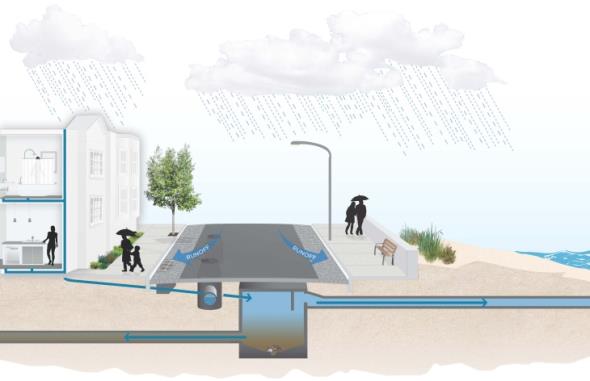 San Francisco has a combined wastewater and stormwater system, meaning that stormwater runoff is processed through the same system as wastewater from sinks and toilets. Learn more about San Francisco's combined sewer system here. On San Francisco's west side, gravity brings combined flows to the Westside Pump Station, where it is pumped to the Oceanside Treatment Plant. You can view an animation video of the Westside wastewater system here. The Oceanside Treatment Plant and related facilities - completed in the early 1990s - were built to protect coastal water quality and bring San Francisco in compliance with the Clean Water Act. This combined sewer and stormwater system has reduced the number of discharges into coastal waters by 90% and is a model of environmental performance.
San Francisco has a combined wastewater and stormwater system, meaning that stormwater runoff is processed through the same system as wastewater from sinks and toilets. Learn more about San Francisco's combined sewer system here. On San Francisco's west side, gravity brings combined flows to the Westside Pump Station, where it is pumped to the Oceanside Treatment Plant. You can view an animation video of the Westside wastewater system here. The Oceanside Treatment Plant and related facilities - completed in the early 1990s - were built to protect coastal water quality and bring San Francisco in compliance with the Clean Water Act. This combined sewer and stormwater system has reduced the number of discharges into coastal waters by 90% and is a model of environmental performance.
Ocean Beach is a challenging setting, with storm-driven waves contributing to erosion of coastal bluffs. As climate change causes sea levels to rise, erosion is expected to worsen, further threatening coastal infrastructure like roads and sewers, and causing the beach to narrow. At South Ocean Beach, shoreline erosion is threatening the most seaward component of the combined system — the Lake Merced Tunnel, a fourteen-foot diameter pipe under the Great Highway. Other components are located just behind the tunnel. To address erosion and sea level rise threats to this critical infrastructure, SFPUC participated in the development of the Ocean Beach Master Plan (more detail below) and subsequently published a Coastal Protection Measures & Management Strategy Report.
City, state, and federal agencies are working together with beach users and community members to adapt to these coastal changes and to protect critical infrastructure while supporting open space, recreation, and natural habitat.
Ocean Beach Master Plan
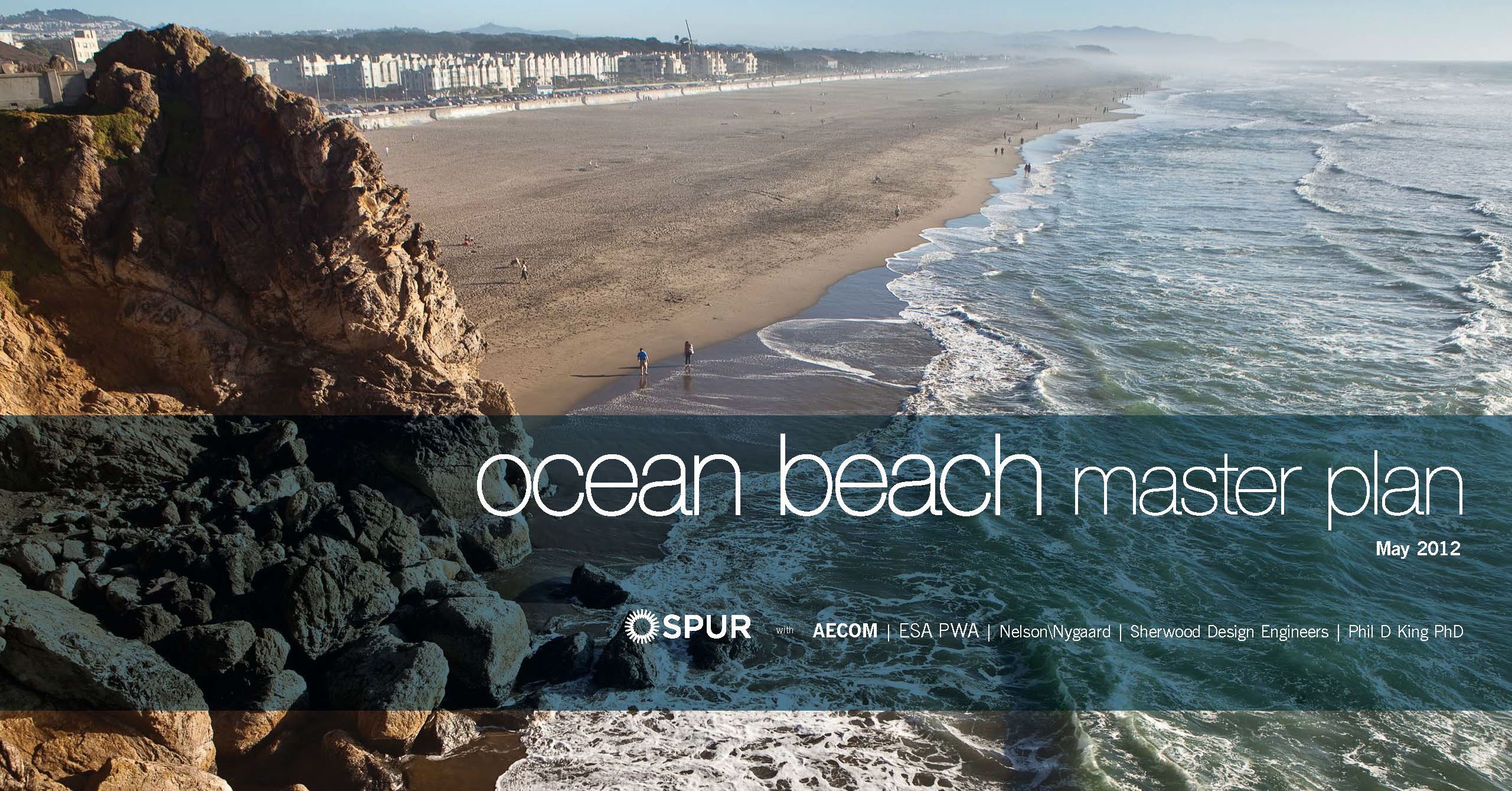 Since 2010, there has been an extensive interagency and public process to develop the Ocean Beach Master Plan, a comprehensive vision to address sea level rise, protect infrastructure, restore coastal ecosystem, and improve public access. This Master Plan, published in 2012, contains over forty recommendations grouped into one of six Key Moves and organized by three geographical reaches. These recommendations are designed to be implemented incrementally over a period of decades.
Since 2010, there has been an extensive interagency and public process to develop the Ocean Beach Master Plan, a comprehensive vision to address sea level rise, protect infrastructure, restore coastal ecosystem, and improve public access. This Master Plan, published in 2012, contains over forty recommendations grouped into one of six Key Moves and organized by three geographical reaches. These recommendations are designed to be implemented incrementally over a period of decades.
South Reach: South of Sloat Boulevard
Key Move 1: Reroute the Great Highway behind the zoo via Sloat and Skyline Boulevards
Key Move 2: Introduce a multipurpose coastal protection/restoration/access sytem
Middle Reach: Lincoln Way to Sloat Boulevard
Key Move 3: Reduce the width of the Great Highway to provide amenities and facilitate managed retreat*
Key Move 4: Restore the dunes along the middle reach
North Reach: Lincoln Way to 48th Avenue
Key Move 5: Create a better connection between Golden Gate Park and Ocean Beach
Key Move 6: Introduce bicycle and pedestrian improvements north of Balboa Street
* This move was ultimately removed from the Plan.
San Francisco Sea Level Rise Action Plan
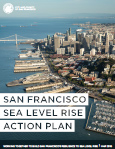 The Ocean Beach Master Plan is integrated with the City's efforts to understand and address sea level rise. In March 2015, San Francisco Mayor Ed Lee assembled the Sea Level Rise Coordinating Committee, an interagency task force of City departments to develop a comprehensive city-wide understanding of the threat of sea level rise and to create a decisive plan of action. In March 2016, the Sea Level Rise Coordinating Committee published the San Francisco Sea Level Rise Action Plan, which established an overarching vision, goals, and a set of guiding principles for sea level rise planning in San Francisco. Using the adaptation strategies identified in the Sea Level Rise Action Plan, the Sea Level Rise Coordinating Committee is working towards preparing a Sea Level Rise Adaptation Plan that will identify potential funding sources and prioritize investments to improve climate resilience while protecting economic and environmental value.
The Ocean Beach Master Plan is integrated with the City's efforts to understand and address sea level rise. In March 2015, San Francisco Mayor Ed Lee assembled the Sea Level Rise Coordinating Committee, an interagency task force of City departments to develop a comprehensive city-wide understanding of the threat of sea level rise and to create a decisive plan of action. In March 2016, the Sea Level Rise Coordinating Committee published the San Francisco Sea Level Rise Action Plan, which established an overarching vision, goals, and a set of guiding principles for sea level rise planning in San Francisco. Using the adaptation strategies identified in the Sea Level Rise Action Plan, the Sea Level Rise Coordinating Committee is working towards preparing a Sea Level Rise Adaptation Plan that will identify potential funding sources and prioritize investments to improve climate resilience while protecting economic and environmental value.
Local Coastal Program
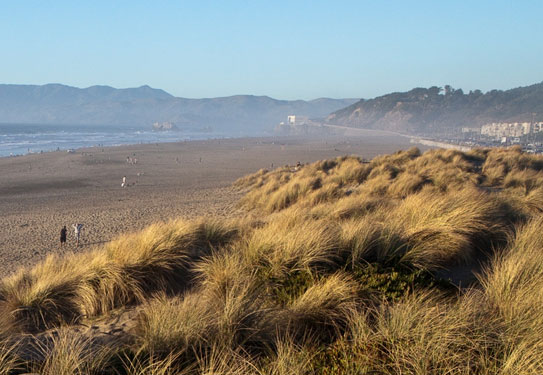 The Local Coastal Program (LCP) is a policy and regulatory document required by the California Coastal Act that establishes policies on land use, development, natural resource protection, coastal access, and public recreation for San Francisco's Coastal Zone. Originally certified in 1986, the LCP was amended in May 2018 to include recommendations from the Ocean Beach Master Plan. Because of the urgent need for action in South Ocean Beach, this May 2018 LCP Amendment only addresses implementation of the recommendations related to sea level rise and coastal management. Master Plan recommendations not addressed in this LCP Amendment are anticipated to be addressed in future amendments.
The Local Coastal Program (LCP) is a policy and regulatory document required by the California Coastal Act that establishes policies on land use, development, natural resource protection, coastal access, and public recreation for San Francisco's Coastal Zone. Originally certified in 1986, the LCP was amended in May 2018 to include recommendations from the Ocean Beach Master Plan. Because of the urgent need for action in South Ocean Beach, this May 2018 LCP Amendment only addresses implementation of the recommendations related to sea level rise and coastal management. Master Plan recommendations not addressed in this LCP Amendment are anticipated to be addressed in future amendments.
More information about San Francisco's LCP Amendment can be found here.
Implementation Projects
As a result of these planning efforts, a number of projects are currently underway that will implement aspects of the Ocean Beach Master Plan (e.g., changes to roadway south of Sloat, changes to public access, and coastal management) and prepare Ocean Beach for a changing climate. These projects, implemented by members of the Ocean Beach Coordination Team, are designed to address sea level rise and coastal erosion in South Ocean Beach by making changes to roadways south of Sloat Boulevard and implementing coastal improvements. More information on these projects is included below.
Changes to Roadway South of Sloat
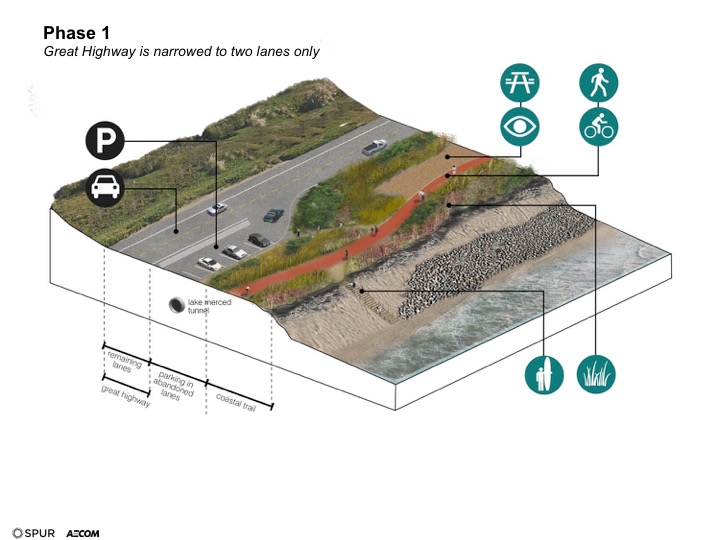 The projects detailed below will make changes to the Great Highway between Sloat and Skyline Boulevards. This series of projects work together towards increasing resilience, improving reliability, and reducing vulnerability. Implementing a managed retreat approach helps increase the resiliency of south Ocean Beach and minimize the impacts of sea level rise.
The projects detailed below will make changes to the Great Highway between Sloat and Skyline Boulevards. This series of projects work together towards increasing resilience, improving reliability, and reducing vulnerability. Implementing a managed retreat approach helps increase the resiliency of south Ocean Beach and minimize the impacts of sea level rise.
Great Highway Roadway Improvements
Great Highway Roadway Improvements has several components and is being implemented by San Francisco Public Works and the California Department of Transportation. This effort will convert the portion of Great Highway between Sloat and Skyline Boulevards from 4 lanes to 2 lanes. The two northbound lanes will be converted into a single northbound and a single southbound travel lane; and the two vacated southbound lanes will be converted to safer coastal access parking and a multi-use trail. This effort will also signalize the intersection at Great Highway and Skyline Boulevard and make necessary ADA and safety improvements to the intersection. The Great Highway Roadway Improvements will decrease exposure to coastal hazards and help facilitate safe bicycle and pedestrian connections between Lake Merced, Ocean Beach, and Golden Gate Park. The project is anticipated to begin in April 2019.
More information about the Great Highway Roadway Improvements can be found here.
Sloat and Skyline Intersection Improvements
The Sloat and Skyline Intersection Improvements Project will improve overall safety for all road users at the intersection of Sloat and Skyline Boulevards. The project, being implemented by the San Francisco Municipal Transportation Agency, is currently in the planning phase with several alternatives being considered. The Sloat Skyline Intersection Alternatives Analysis will identify options to make the intersection a more inviting, safe, and comfortable experience for all users. This project is an important component of vehicular circulation as other changes to the area are implemented.
More information about the Sloat and Skyline Intersection Improvements Project can be found here.
Changes to Public Access
South Ocean Beach Multi-Use Trail and Parking Lot
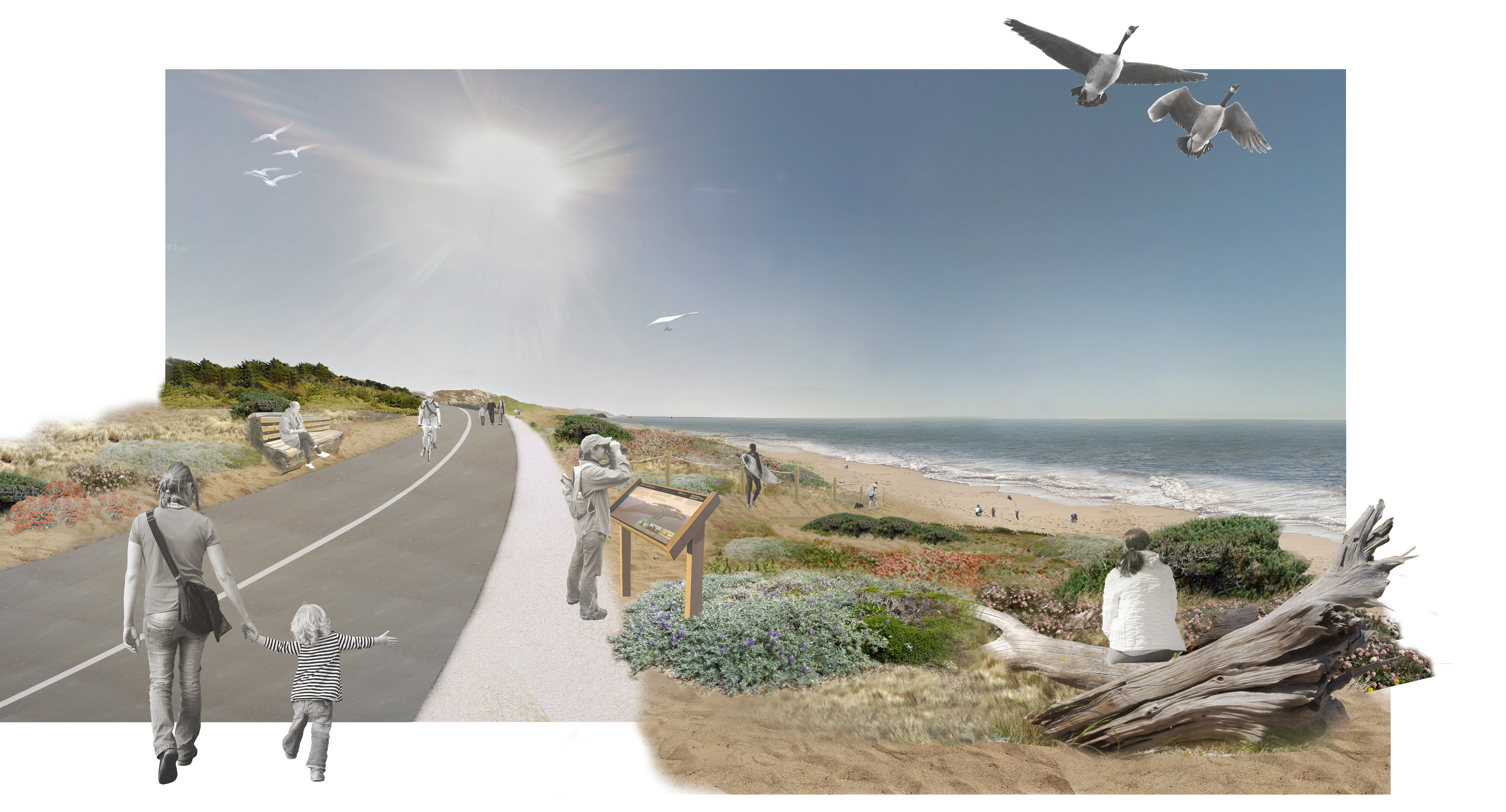 The South Ocean Beach Multi-Use Trail and Parking Lot Project will build a new multi-use trail and parking lot on the two southbound Great Highway lanes between Sloat and Skyline that will be vacated by the Great Highway Roadway Improvements. This project will provide pedestrian and bicycle access along Ocean Beach, nearby open spaces, and beach parking, while working toward closing a gap in the California Coastal Trail. Funded by a Federal grant and local transportation sales tax funds, the project is being implemented by San Francisco Recreation and Parks.
The South Ocean Beach Multi-Use Trail and Parking Lot Project will build a new multi-use trail and parking lot on the two southbound Great Highway lanes between Sloat and Skyline that will be vacated by the Great Highway Roadway Improvements. This project will provide pedestrian and bicycle access along Ocean Beach, nearby open spaces, and beach parking, while working toward closing a gap in the California Coastal Trail. Funded by a Federal grant and local transportation sales tax funds, the project is being implemented by San Francisco Recreation and Parks.
More information on the South Ocean Beach Multi-Use Trail Project can be found here.
Fort Funston Trail Connection
The Fort Funston Trail Connection Project proposes to construct a new trail to connect the new parking area at the intersection of Great Highway and Skyline Boulevard (part of the South Ocean Beach Multi-Use Trail Project) to the Fort Funston trail network. The proposed trail would provide access from the new parking area and South Ocean Beach Multi-Use Trail into Fort Funston's network of trails, closing a gap in the California Coastal Trail. The Fort Funston Trail Connection Project would be implemented by the National Park Service.
More information on the Fort Funston Trail Connection Project will be made available once the project enters the planning phase.
Coastal Management
Ocean Beach Short-Term Improvements
The Ocean Beach Short-Term Improvements Project, being implemented by the San Francisco Public Utilities Commission (SFPUC), is an effort to provide interim protection and improved beach access while the Long-Term improvements are under development. This project involves beach nourishment activities (e.g. sand backpassing) and installation of sandbags along the southern portion of Ocean Beach fronting the Great Highway. This project is a critical environmentally-friendly approach that is protecting public infrastructure and improving beach access while the Ocean Beach Long-Term Improvements Project completes environmental review, design and is ready for implementation. The annual sand replenishment activities are informed by annual monitoring efforts required by the SFPUC's Coastal Development Permit.
More information about the Ocean Beach Short-Term Improvements Project can be found here.
Ocean Beach Long-Term Improvements
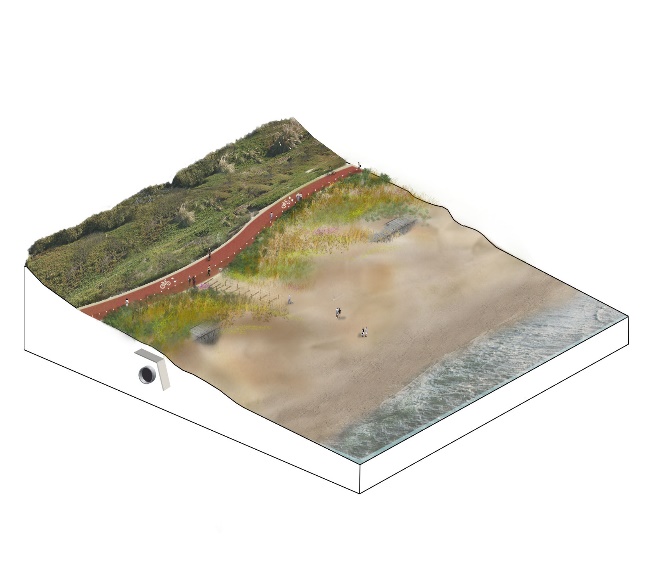 The Ocean Beach Long-Term Improvements Project is the result of extensive planning and analysis work, (e.g., Ocean Beach Master Plan and Coastal Protection Measures and Management Strategy) which is captured in the Alternatives Analysis Report. This project is expected to involve the implementation of coastal management strategies that include managed retreat (i.e., recontouring the bluffs and removing the Great Highway between Sloat and Highway 35), removal of rubble and revetment rock from the beach and bluffs, continued beach nourishment, and installation of a low-profile wall to protect the Lake Merced Tunnel. This project will not only protect vital public wastewater infrastructure, but will also improve access, recreation, and habitat at South Ocean Beach. The Ocean Beach Long-Term Improvements Project, being implemented by the San Francisco Public Utilities Commission, is expected to begin construction in 2022.
The Ocean Beach Long-Term Improvements Project is the result of extensive planning and analysis work, (e.g., Ocean Beach Master Plan and Coastal Protection Measures and Management Strategy) which is captured in the Alternatives Analysis Report. This project is expected to involve the implementation of coastal management strategies that include managed retreat (i.e., recontouring the bluffs and removing the Great Highway between Sloat and Highway 35), removal of rubble and revetment rock from the beach and bluffs, continued beach nourishment, and installation of a low-profile wall to protect the Lake Merced Tunnel. This project will not only protect vital public wastewater infrastructure, but will also improve access, recreation, and habitat at South Ocean Beach. The Ocean Beach Long-Term Improvements Project, being implemented by the San Francisco Public Utilities Commission, is expected to begin construction in 2022.
More information about the Ocean Beach Long-Term Improvements Project can be found here.
Other Projects in the Vicinity
Westside Pump Station Reliability Improvements
The Westside Pump Station Reliability Improvements Project is part of the Sewer System Improvement Program (SSIP), a 20-year, multi-billion dollar citywide investment required to upgrade the City's aging sewer system. This project, implemented by the San Francisco Public Utilities Commission, will construct improvements and modifications needed to ensure that the pump station is reliable and able to maintain water quality requirements. Improvements include providing redundant electrical service feeds and replacing essential wastewater process mechanical and electrical equipment for facility wet weather operations. Construction is anticipated to begin in early 2019.
More information about the Westside Pump Station Reliability Improvements Project can be found here.